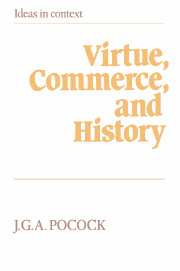 Virtue, Commerce, and History
Virtue, Commerce, and History Book contents
- Frontmatter
- Contents
- 1 Introduction: The state of the art
- PART I
- PART II
- 5 Modes of political and historical time in early eighteenth-century England
- 6 The mobility of property and the rise of eighteenth-century sociology
- 7 Hume and the American Revolution: The dying thoughts of a North Briton
- 8 Gibbon's Decline and Fall and the world view of the Late Enlightenment
- 9 Josiah Tucker on Burke, Locke, and Price: A study in the varieties of eighteenth-century conservatism
- 10 The political economy of Burke's analysis of the French Revolution
- PART III
- Index
10 - The political economy of Burke's analysis of the French Revolution
Published online by Cambridge University Press: 05 May 2010
- Frontmatter
- Contents
- 1 Introduction: The state of the art
- PART I
- PART II
- 5 Modes of political and historical time in early eighteenth-century England
- 6 The mobility of property and the rise of eighteenth-century sociology
- 7 Hume and the American Revolution: The dying thoughts of a North Briton
- 8 Gibbon's Decline and Fall and the world view of the Late Enlightenment
- 9 Josiah Tucker on Burke, Locke, and Price: A study in the varieties of eighteenth-century conservatism
- 10 The political economy of Burke's analysis of the French Revolution
- PART III
- Index
Summary
There are, perhaps, in the end only two ways in which a historian may undertake the study of a document in the history of political thought. One may consider it as a text, supposed to have been intended by its author and understood by its reader with the maximum coherence and unity possible; the historian's aim now becomes the reconstitution of the fullest possible interpretation available to intelligent readers at the relevant time. Alternatively, one may consider it as a tissue of statements, organized by its writer into a single document, but accessible and intelligible whether or not they have been harmonized into a single structure of meaning. The historian's aim is now the recovery of these statements, the establishment of the patterns of speech and thought forming the various contexts in which they become intelligible, and the pursuit of any changes in the normal employment of these patterns which may have occurred in consequence of the statements being made.
Both approaches have their advantages and disadvantages. It is the second which will be attempted, in this essay, to Burke's Reflections on the Revolution in France and subsequently to his Letters on a Regicide Peace.
- Type
- Chapter
- Information
- Virtue, Commerce, and HistoryEssays on Political Thought and History, Chiefly in the Eighteenth Century, pp. 193 - 212Publisher: Cambridge University PressPrint publication year: 1985
- 18
- Cited by
